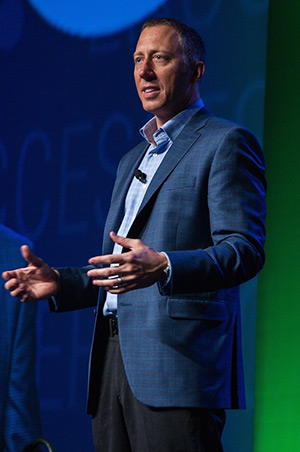
Todd Mohr
President, Aerotek
Headquarters: Hanover, Maryland
Education: University of Washington Michael G. Foster School of Business
First Job: Selling dictation equipment for Pitney Bowes
What I’m Reading: Fall of Giants by Ken Follett
Best Advice: Hard work beats talent when talent doesn’t work hard.
“Leaders deliver honest, real-time coaching and feedback, and recognize that doing so is important not only to help each employee succeed in the now, but also to help him or her build a successful future.”
What role does leadership play in driving talent to reach their best potential?
Since becoming president of Aerotek, I’ve thought a lot about the role of leadership in driving talent to reach their full potential. Our company’s leaders and their legacies—their responsibility to play an active role in helping employees achieve and excel—define our culture. But how do we attract, develop, and promote future leaders? At its essence, what is true leadership, and how do we reinforce a culture of leaders?
I’ve come to believe that each of us must understand and practice three core responsibilities that are critical to being an effective leader at Aerotek. These three habits apply to any role or level within our organization—whether managing one person, a department, or an entire company. As progressive practices, each provides the foundation for the next:
- Build relationships. Great leaders recognize their obligation to do two things—put the needs of their employees before their own and truly understand the people around them. They consider more than the mechanics of an employee’s role, they also have a genuine sense of why that person has chosen to do that job—his or her motivations, definition of success, and unique skills.
- Manage with intention. Leaders not only value their employees’ and peers’ strengths and passions, but also see how to apply those attributes to the organization’s needs. Leaders deliver honest, real-time coaching and feedback, and recognize that doing so is important not only to help each employee succeed in the now, but also to help him or her build a successful future.
- Lead with courage. It’s no secret that leaders have a responsibility to make hard decisions, to challenge the status quo, and to be the unpopular voice when needed. But beyond that, true leadership requires us to have the courage to challenge employees and peers, sharing difficult feedback regarding how an individual “shows up” in his or her role and exposing blind spots—unconscious attributes or behaviors that can limit one’s growth.
Without an invested, foundational relationship that instills trust and accountability, managing would be difficult, but leading would be impossible. So as we continue to grow in today’s global world, it is my utmost responsibility to uphold a culture that empowers every employee and creates true leaders at every level of the organization.







Thank you, Mr. Mohr for your profile and leadership still as President of a top STEM recruiting firm today in the U.S. This comment relates to your “Courage” bullet for being an effective leader. That is, one with a high-profile core responsibility is not an effective leader on the national stage if he or she plays favorites with particular parts of the cognitive diversity spectrum. Being effective here as a leader means having the courage with one’s colleagues and recruited employees to go against the trend of spending the most time and money on preferentially developing those deemed the best and brightest (B&B). First of all, a common misconception about who are the B&B is that they are exclusively those who can already demonstrate, by various standard observable measures, such powerful potential as scientists and engineers to become our future heroes and heroines in their accomplishments in the workplace (such as the discovery of new knowledge or inventions and innovations with new technology), that they are an exclusive ‘shoe in’ for actually realizing that promise. So they receive from their employer a disproportionately large investment of company resources to ensure that these B&B-designates succeed. Second, that approach of favoritism leaves out many of those who, through their fragility and vulnerability, cannot demonstrate such powerful potential at a young or early age and thus receive a disproportionately small investment for developing their own careers of heroic accomplishment. With absence of any meaningful early intervention by their bosses, then, that sense of who the B&B are becomes a self-fulfilling prophecy. In closing, a more equitable distribution of company resources including mentoring, scholarships, and tailored job assignments will, in my view of any worker as a human person with the same potential for accomplishment as any other worker, better ‘grow’ the employer’s pool of the B&B than the typical approach today that many employers use, of favoritism of the demonstrably able at the expense of the cognitively disabled.